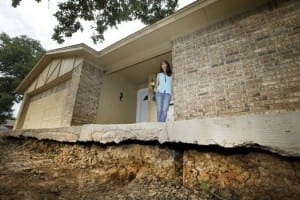It is significant that underground conditions have changed to trigger slips on a fault line that hasn’t moved in human memory.
Journalist Dylan Baddour covered the recent interim report about the research findings of Southern Methodist University’s seismology team surrounding a recent series of earthquakes in the Irving, Texas area.
His Houston Chronicle report, “New data shows North Texas fault line,” covered the preliminary findings and the progress on the team’s earthquake research.
Book a live interview

Book a live or taped interview with Brian Stump in the SMU Broadcast Studio. Call 214-768-7650; email news@smu.edu. |
Book a live interview

Book a live or taped interview with Heather DeShon in the SMU Broadcast Studio. Call 214-768-7650; email news@smu.edu.
Related links
- Heather DeShon
- Brian Stump
- “Understanding recent North Texas seismicity”
- Roy M. Huffington Department of Earth Sciences
- SMU’s Dedman College
More SMU Research news
Initial results reveal that the earthquakes that occurred near the site of the old Texas Stadium were relatively shallow and concentrated along a narrow two mile line that indicates a fault extending from Irving into West Dallas.
SMU and the United States Geological Survey shared the report with the mayors of Dallas and Irving spelling out preliminary information gleaned after SMU’s installation in January of more than 20 portable earthquake monitors around the earthquake sites. SMU seismologists Heather DeShon and Brian Stump, in the Roy M. Huffington Department of Earth Sciences, answered questions during the briefing with reporters.
The article published Feb. 11, 2015.
EXCERPT:
By Dylan Baddour
Houston Chronicle
North Texas earthquake swarms still baffle geologists, who never expected to study seismic tremors in the Lone Star State. But last month scientists installed equipment to record quakes near Irving, Texas, and last week the first numbers came in.We still don’t know much about why the region shakes, but here’s what we just learned: the quakes have all been relatively shallow, and have centered along a newly-identified fault line near Irving. The data is thanks 20 seismic monitoring machines, supplied by the U.S. Geological Survey and deployed by scientists from Texas’ Southern Methodist University last month.
“This is a first step, but an important one, in investigating the cause of the earthquakes,” said SMU seismologist Brian Stump. “Now that we know the fault’s location and depth, we can begin studying how this fault moves – both the amount and direction of motion.”
Irving, just north of Dallas, shook first in April 2014, but the area’s strongest quakes struck last month. The so-called “earthquake swarm” follows others since 2008 that have hit North Texas—a region with no history of seismic action. This year, the USGS announced plans to raise the region’s official earthquake risk level. Still, no one knows why the region has started to tremble.
“The two views about them. One: in 150 years there haven’t been natural earthquakes in the Dallas-Fort Worth area, so if these earthquakes were natural, that’s very interesting,” said Cliff Frolich, a geologist at the University of Texas at Austin and a veteran researcher of the North Texas quakes. “On the other hand the earthquakes that occurred in 2008 and subsequently appear to be close to injection wells. The fact that these earthquakes are occurring only a few years later, some people would probably conclude they are related to oil and gas activities.”
Injection wells are where oil and gas drillers dispose of tens of millions of gallons of toxic wastewater left over from hydraulic fracturing, or “fracking,” an extraction technique that’s proliferated in Texas and across the country since 2008. Some scientists have suggested that pressure put on fault lines by high-powered injection into bedrock could trigger the quakes, but nothing is conclusive.
Follow SMUResearch.com on twitter at @smuresearch.
SMU is a nationally ranked private university in Dallas founded 100 years ago. Today, SMU enrolls nearly 11,000 students who benefit from the academic opportunities and international reach of seven degree-granting schools. For more information see www.smu.edu.
SMU has an uplink facility located on campus for live TV, radio, or online interviews. To speak with an SMU expert or book an SMU guest in the studio, call SMU News & Communications at 214-768-7650.
By Margaret Allen
Senior research writer, SMU Public Affairs
View Archive →

 Women who are told men desire women with larger bodies are happier with their weight
Women who are told men desire women with larger bodies are happier with their weight Fossil supervolcano in Italian Alps may answer deep mysteries around active supervolcanoes
Fossil supervolcano in Italian Alps may answer deep mysteries around active supervolcanoes Study: Contraception may change how happy women are with their husbands
Study: Contraception may change how happy women are with their husbands Study funded by NIH is decoding blue light’s mysterious ability to alter body’s natural clock
Study funded by NIH is decoding blue light’s mysterious ability to alter body’s natural clock